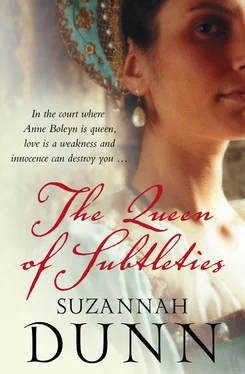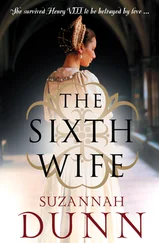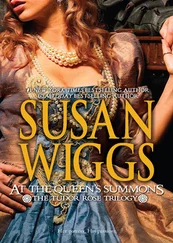I’d say Wolsey was too big for his boots, but let’s not beat about the bush: what Wolsey was too big for was England. Never before had there been a man in England so rich and powerful who wasn’t a king. Moreover, this was a man who wasn’t anything at all, not originally: a nobody turned cleric, a butcher’s boy become cardinal. The nobles had a thing or two to say about that, behind his back.
I suppose that’s why Henry trusted him with the kingdom: no friends to favour; no claim to the throne. Henry’s talent—the best talent of all—is for recognizing other’s talents. I wonder, now, if I should include myself in that. Did he see that I’d flinch at nothing to rid him of that used-up wife? He recognizes talent and he trusts: he trusts absolutely; right up until when, suddenly, he doesn’t. It’s Thomas Cromwell whom he trusts now: Cromwell, the next and even better Wolsey. Wolsey’s talent had been running the country for Henry. And serious statesman though Henry is…well, when he was young, his passion was for the good life. He’d do a certain amount of work, but then he’d want to go hunting or dancing. Wolsey would stay behind and pick up the pieces. And build palaces from them.
If anyone was a match for Wolsey, glorified butcher’s boy, then it was me, king-favoured granddaughter of a merchant. I knew where he was coming from. He, however, didn’t even know I was coming. Me being a woman, he didn’t see me coming. And I was ample match for him: no chinless wonder; no Stafford, who, four or five years earlier, had assumed he could click his fingers and have the nobility collect quietly behind him while he asked the Tudors a few awkward questions about their lineage. When Stafford clicked his fingers, Henry overheard. Henry did some clicking of his own—for quill, ink, warrant—and Stafford went to the block. This, from a king not given in those days to bloodshed; a king who loved to be loved. Stafford’s execution had left them all—even my Uncle Norfolk—sulking, subdued. But me, no. Stafford was history for me, I’d never known the man and wouldn’t have liked him if I had. He was no loss for me: one more English aristocrat peering down his pox-eroded nose at the likes of us Boleyns. What had happened to Stafford was no warning to me. I wasn’t about to lose my nerve.
Lucy Cornwallis SPRING 1535
The door’s opening, and there’s someone in the doorway. The someone’s asking, ‘Miss Cornwallis?’ Male, young, not a voice I know. Bad timing: I can’t take my eyes from this pan of boiling sugar, it’s just about to reach the crucial point. He shouldn’t be knocking at the confectionery door; he should know better. There’s delicate work going on, in here; everyone knows that. What’s the matter with these boys, knocking on this door all day long? ‘Richard’s not here,’ I tell him. ‘Can you shut the door, please?’ I can’t have the temperature drop; and it’s barely spring, outside.
He obliges. But he’s still here. True, I didn’t actually say, With you on the other side of it. Swiping the pan from the flame, I glimpse him. Glossy black hair; pale-faced, kid-pale; dark eyes. I settle the pan in a basin of water; and through the hiss of steam, I hear him saying, ‘You’ve a sore throat.’ Concerned. For me, by the sound of it; not for himself, for the prospect of contagion.
‘Dry,’ I clarify; feel obliged to. ‘Sticky. Comes of working in here.’ Our confectionery kitchen is purpose-built, here, at Hampton Court: we’re on the first floor above the pastry ovens. Good for sugar, not so good for me. ‘And from the sugar.’ Sugar, powdered, gets everywhere. In my hair and down my throat. When I glimpsed him, just now, it was through sugared eyelashes. ‘Look,’ I ask him, ‘if you find Richard, can you tell him to get back here?’
He draws breath, as if he’s about to say something, but I hear no more.
Good. I’m not passing messages.
And he goes. Gently closing the door. Not a typical Richard-visitor, in that respect.
Time to take the pan to the marble slab, to drop and settle the syrup, bit by bit, into the warmed, oiled moulds. Three dozen Tudor roses, each the size of the circle made by forefinger and thumb. Old-fashioned sugar plate, the boiled-up kind. The temperamental kind. Why isn’t Richard doing this? I could be getting on with something else. It’s not as if there isn’t a lot else for me to do.
And lo and behold: Richard, slipping into the room as if his absence has been of no consequence. In his twenties, but acting as if he’s still in his teens. An odd mix, Richard: worldly and other-worldly. Whatever he says—and whatever I feel—I’m not in fact old enough to be his mother. Yet it’s as if there’s not just a generation’s difference between us, but a lifetime’s. He steps out of his clogs and, shoeless, pads across the warm oak floor. Standing a head above me, he looks down over my shoulder at the glistening, amber roses. And keeps looking. Which makes me uneasy. I scan the roses for imperfections—bubblings, darkenings—and wonder how it happened that he checks up on my work.
Now he has his back to me, bending down, putting his leather slippers on. ‘What needs doing?’
‘You know what needs doing. Because you did half of it, earlier.’
We both look at it: a Marchepane, an embossed disc of marzipan as big as the king’s biggest dinner plates. Not long out of the mould, it’s cooling. But if Richard isn’t quick, it’ll be too cool and the goldleaf won’t stick.
‘Did we get the goldleaf?’ he asks.
‘I got the goldleaf, yes. I need this pan washed—where is Stephen?’ A glance out of the window reveals nothing but wet cobbles and a smile from the yeoman guarding the spicery office. ‘Oh—’ I remember—‘did he find you?’
‘Stephen?’ Richard’s peering into Kit’s abandoned mortar; shifting the pestle among the grains, his eyes closed and head cocked.
‘No. That boy, just now.’
‘Who?’ He touches a fingertip to the inside of the mortar, then raises the hand, palm upwards, into the light, as if setting something free.
‘He didn’t, then.’
‘Who?’
‘I don’t know. Someone came looking for you.’
He dabs the forefinger into the basin of water, rubs it with his thumb. ‘What’d he look like?’
‘Nice-looking.’ Because it occurs to me that this was what he’d been.
‘Nice-looking?’ Richard regards me admiringly. He enunciated the expression as if it had never been used before. ‘Well, could have been anyone,’ he concludes, breezily. ‘You know what I always say: if he wants me badly enough, he’ll come looking again.’
‘Is that—’ I nod towards the mortar—‘up to it?’ Down to it: ground sufficiently for today’s purposes.
‘Of course. Kit’s a good man.’
True, but Richard rarely says so. He can be a hard taskmaster, even though it isn’t his job to be any kind of taskmaster at all; it’s mine. I say, ‘You’re in a good mood.’
He’s browsing along the shelves of spices, doesn’t look at me. ‘Yeah, well,’ is all he says.
And yet again I wonder: how come he’s so familiar with me, and I know so little about him? I brought him up from an orphan, an under-sized urchin living on his wits. I made him who he is, now: confident, respected assistant to the king’s confectioner. (Equal, really: face it. Equal, now, in skill. Rival, if he so chose.) But in so many ways he’s a mystery to me. Sometimes I can barely believe that we’ve spent a decade living alongside each other, working together all day every day and then spending our nights in adjacent lodgings. All these years living like sister and brother. Perhaps that’s why he still captivates me. I find myself watching him when he’s absorbed, when a peculiar clarity comes into those river-green eyes of his and everything that is Richard dissolves away in them, leaving them with a life of their own. For all the contrived appearance to the contrary, he’s deadly serious about his work. That’s something I do know about him. Something I’ve learned. It’s probably the only aspect of life that he’s serious about. I’m probably the only person who ever gets to see beyond his flippancy.
Читать дальше












